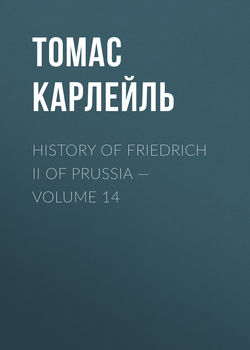Читать книгу History of Friedrich II of Prussia — Volume 14 - Томас Карлейль - Страница 9
BOOK XIV.—THE SURROUNDING EUROPEAN WAR DOES NOT END.—August, 1742-July, 1744 Chapter II.—AUSTRIAN AFFAIRS ARE ON THE MOUNTING HAND CONCERNING THE ITALIAN WAR WHICH SIMULTANEOUSLY WENT ON, ALL ALONG
ОглавлениеWar in Italy—the Spanish Termagant very high in her Anti-Pragmatic notions—there had been, for eight months past; and it went on, fiercely enough, doggedly enough, on both sides for Six Years more, till 1748, when the general Finis came. War of which we propose to say almost nothing; but must request the reader to imagine it, all along, as influential on our specific affairs.
The Spanish Termagant wished ardently to have the Milanese and pertinents, as an Apanage for her second Infant, Don Philip; a young gentleman who now needs to be provided for, as Don Carlos had once done. "Cannot get to be Pope this one, it appears," said the fond Mother (who at one time looked that way for her Infant,): "Well, here is the Milanese fallen loose!" Readers know her for a lady of many claims, of illimitable aspirations; and she went very high on the Pragmatic Question. "Headship of the Golden Fleece, Madam; YOU head of it? I say all Austria, German and Italian, is mine!"—though she has now magnanimously given up the German part to Kaiser Karl VII.; and will be content with the Italian, as an Apanage for Don Philip. And so there is War in Italy, and will be. To be imagined by us henceforth.
A War in which these Three Elements are noticeable as the chief. FIRST, the Sardinian Majesty, [Charles Emanuel, Victor Amadeus's Son (Hubner, t. 293): born 27th April, 1701; lived and reigned till 19th February, 1773 (OErtel, t. 77).] who is very anxious himself for Milanese parings and additaments; but, except by skilfully playing off-and-on between the French side and the Austrian, has no chance of getting any. For Spain he is able to fight; and also (on good British Subsidies) against Spain. Element SECOND is the British Navy, cruising always between Spain and the Seat of War; rendering supplies by sea impossible,—almost impossible. THIRD, the Passes of Savoy; wild Alpine chasms, stone-labyrinths; inexpugnable, with a Sardinian Majesty defending; which are the one remaining road, for Armies and Supplies, out of Spain or France.
The Savoy Passes are, in fact, the gist of the War; the insoluble problem for Don Philip and the French. By detours, by circuitous effort and happy accident, your troops may occasionally squeeze through: but without one secure road open behind them for supplies and recruitments, what good is it? Battles there are, behind the Alps, on what we may call the STAGE itself of this Italian War-theatre; but the grand steady battle is that of France and Don Philip, struggling spasmodically, year after year, to get a road through the COULISSES or side-scenes,—namely, those Savoy Passes. They try it by this Pass and by that; Pass of Demont, Pass of Villa-Franca or Montalban (glorious for France, but futile), Pass of Exilles or Col d'Assiette (again glorious, again futile and fatal); sometimes by the way of Nice itself, and rocky mule-tracks overhanging the sea-edge (British Naval-cannon playing on them);—and can by no way do it.
There were fine fightings, in the interior too, under Generals of mark; General Browne doing feats, excellent old General Feldmarschall Traun, of whom we shall hear; Maillebois, Belleisle the Younger, of whom we have heard. There was Battle of Campo-Santo, new battle there (Traun's); there was Battle of Rottofreddo; of Piacenza (doleful to Maillebois),—followed by Invasion of Provence, by Revolt of Genoa and other things: which all readers have now forgotten. [Two elaborate works on the subject are said to be instructive to military readers: Buonamici (who was in it, for a while). De Bello Italico Commentarii (in Works of Buonamici, Lyon, 1750); and Pezay, Campagnes de Maillebois (our Westphalian friend again) en Italie, 1745-1746 (Paris, 1775).] Readers are to imagine this Italian War, all along, as a fact very loud and real at that time, and continually pulsing over into our German Events (like half-audible thunder below the horizon, into raging thunder above), little as we can afford to say of it here. One small Scene from this Italian War;—one, or with difficulty two;—and if possible be silent about all the rest:
